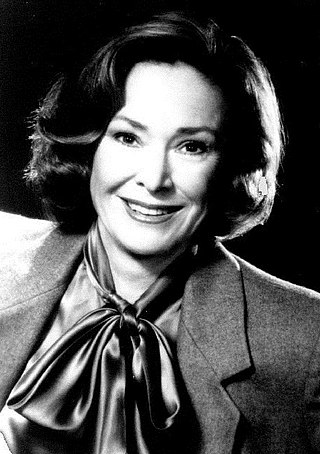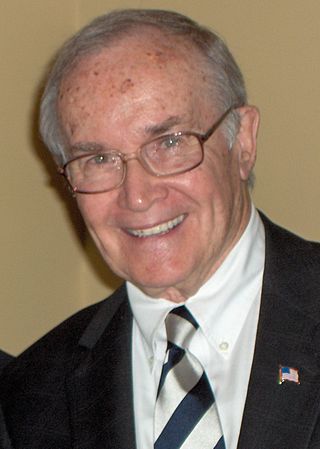
The Corporation for Public Broadcasting (CPB) is an American publicly funded non-profit corporation, created in 1967 to promote and help support public broadcasting. The corporation's mission is to ensure universal access to non-commercial, high-quality content and telecommunications services. It does so by distributing more than 70 percent of its funding to more than 1,400 locally owned public radio and television stations.

National Educational Television (NET) was an American educational broadcast television network owned by the Ford Foundation and later co-owned by the Corporation for Public Broadcasting. It operated from May 16, 1954, to October 4, 1970, and was succeeded by the Public Broadcasting Service (PBS), which has memberships with many television stations that were formerly part of NET.

Joan Ganz Cooney is an American television writer and producer. She is one of the founders of Sesame Workshop, the organization famous for the creation of the children's television show Sesame Street, which was also co-created by her. Cooney grew up in Phoenix and earned a Bachelor of Arts in education from the University of Arizona in 1951. After working for the State Department in Washington, D.C., and as a journalist in Phoenix, she worked as a publicist for television and production companies in New York City. In 1961, she became interested in working for educational television, and became a documentary producer for New York's first educational TV station WNET. Many of the programs she produced won local Emmys.
The National Association of Educational Broadcasters (NAEB) was a US organization of broadcasters with aims to share or coordinate educational programmes. It was founded as the Association of College and University Broadcasting Stations (ACUBS) in 1925 as a result of Fourth National Radio Conference, held by the U.S. Department of Commerce.

Newton Norman Minow was an American attorney who served as chairman of the Federal Communications Commission. He is famous for his 1961 speech referring to television as a "vast wasteland". While still maintaining a law practice, Minow served as the Honorary Consul General of Singapore in Chicago, beginning in 2001.

WETA-TV is the primary PBS member television station in Washington, D.C. Owned by the Greater Washington Educational Telecommunications Association, it is a sister station to NPR member WETA. The two outlets share studios in nearby Arlington County, Virginia; WETA-TV's transmitter is located in the Tenleytown neighborhood in Northwest Washington.
WMUC-FM is the student-run non-commercial radio station licensed to the University of Maryland in College Park, Maryland, broadcasting at 30 watts. It is a freeform radio station staffed entirely by UMD students and volunteers.

Illinois Public Media, previously "WILL AM-FM-TV", is a not-for-profit organization located within the College of Media at the University of Illinois Urbana-Champaign, which is responsible for the university's public media service activities. It manages three university educational broadcasting stations licensed to Urbana, Illinois, United States: NPR member stations WILL and WILL-FM, and PBS member station WILL-TV. Illinois Public Media provides locally produced programs to supplement the network programs carried by its stations. In addition, it manages the Illinois Radio Reader Service, a streaming audio service for the reading impaired.

The Public Broadcasting Act of 1967 issued the congressional corporate charter for the Corporation for Public Broadcasting (CPB), a private nonprofit corporation funded by taxpayers to disburse grants to public broadcasters in the United States, and eventually established the Public Broadcasting Service (PBS) and National Public Radio (NPR). The act was supported by many prominent Americans, including Fred Rogers, NPR founder and creator of All Things Considered Robert Conley, and Senator John O. Pastore of Rhode Island, then chairman of the Senate Subcommittee on Communications, during House and United States Senate hearings in 1967.
The West Central Illinois Educational Telecommunications Corporation was incorporated on February 9, 1976. Its membership was a consortium of Educational Institutions in West-Central Illinois. Bradley University in Peoria, Western Illinois University in Macomb, Blackhawk Community College in Moline, and Sangamon State University in Springfield. Its mission was "to establish an educational television network, provide educational content, create local and public affairs programming to serve the residents and businesses of west-central Illinois". Bylaws for the corporation were approved on January 13, 1984.

Mississippi Public Broadcasting (MPB) is the public broadcasting state network serving the U.S. state of Mississippi. It is owned by the Mississippi Authority for Educational Television (MAET), an agency of the state government that holds the licenses for all of the PBS and NPR member stations in the state. MPB's headquarters is located on Ridgewood Road in northeast Jackson. The public broadcaster was established as Mississippi Educational Television.
Joseph S. Iseman was an attorney and educator known for his work with National Television, Children's Television Workshop, also known as Sesame Workshop, and Bennington College, as well as the American University of Paris, where he served for a time as the vice chair. As a lawyer at the firm of Paul, Weiss, Rifkind, Wharton & Garrison LLP, Iseman notably managed the estates of composer Cole Porter, writer Vladimir Nabokov, writer Jean Stafford, poet Robert Lowell, writer A. J. Liebling, artist Robert Motherwell, writer and historian Theodore H. White, Saturday Review and its editor Norman Cousins, and playwright Arthur Miller. He was also the father of New York City businessman Frederick Iseman.
WQPT-TV, virtual channel 24, is a Public Broadcasting Service (PBS) member television station licensed to Moline, Illinois, United States, serving the Quad Cities area of northwestern Illinois and southeastern Iowa. The station is owned by Western Illinois University-Quad Cities. WQPT-TV's studios are located at Riverfront Hall on the WIU-QC campus in Moline, and its transmitter is located in Orion, Illinois. Master control is based at fellow PBS member WTVP in Peoria, which also has an agreement with WILL-TV in Champaign.
The National Educational Radio Network (NERN) was a means of distributing radio programs in the United States between 1961 and 1970. With funding from the Ford Foundation, the network began broadcasting on six radio stations on April 3, 1961.
Martha Jane Rountree was an American pioneering broadcast journalist and entrepreneur. She was the creator and first moderator of a public-affairs program, first on radio as The American Mercury from June 24, 1945 to 1947, and as Meet the Press on the NBC television network from November 6, 1947 to November 1, 1953. Until Kristen Welker took over on September 17, 2023, Rountree was the only female moderator in the seven-decade history of the show.
Morris S. Novik (1903–1996), an early pioneer in radio, is credited with being one of the first people to understand the potential that radio had for public service and education, especially with regard to the emerging labor movement throughout the U.S. in the early part of the 20th century.
Barbara Taylor Bowman is an American early childhood education expert/advocate, professor, and author. Her areas of expertise include early childhood care/education, educational equity for minority and low-income children, as well as intergenerational family support and roles. She has served on several boards and was the co-founder of Erikson Institute, where she pioneered the teaching of early childhood education and administration.

Margaret Elizabeth Chisholm was an American librarian and educator and served as president of the American Library Association from 1987 to 1988. She promoted librarians as skilled in information technology.
The American Archive of Public Broadcasting (AAPB) is a collaboration between the Library of Congress and WGBH Educational Foundation, founded through the efforts of the Corporation for Public Broadcasting (CPB). The AAPB is a national effort to digitally preserve and make accessible historically significant public radio and television programs created over the past 70+ years. The archive comprises over 120 collections from contributing stations and original producers from US states and territories. As of April 2020, the collection includes nearly 113,000 digitized items preserved on-site at the Library of Congress, and 53,000 items in the collection are streaming online in the AAPB Online Reading Room.
David S. Prowitt was a broadcast television producer and writer during the mid twentieth century. During his career he helped to develop and manage much of the science broadcasting for WNET-TV, PBS during the 1960s-1980s and worked on the shows The Killers, and The Thin Edge. He also produced the documentary news series Bill Moyers' Journal (1972-).








